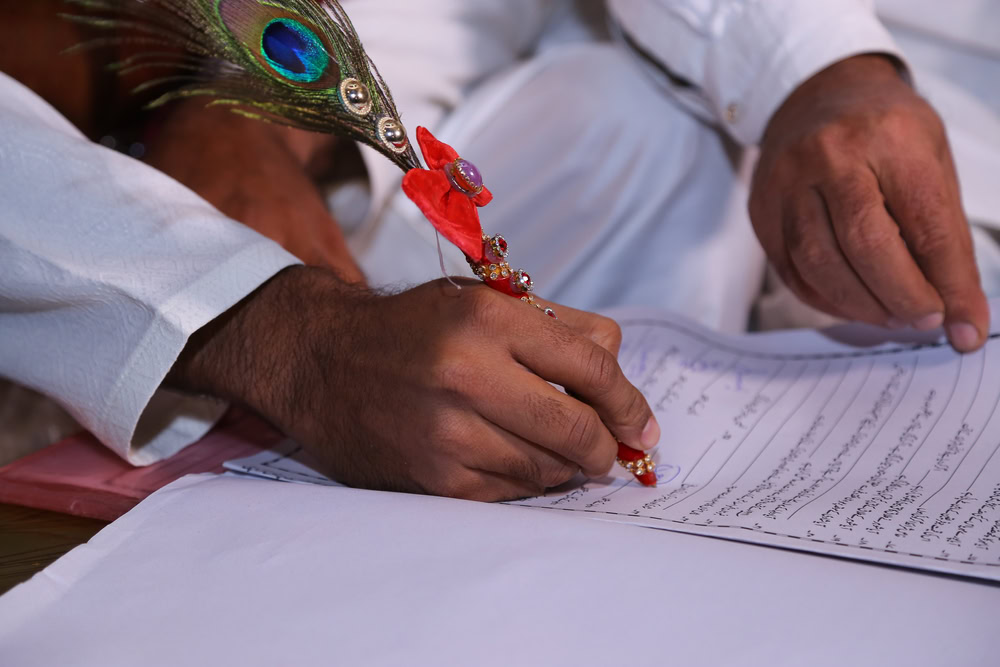What Is the Correct Method for Conducting a Nikah?
Shafi'i Fiqh
Answered by Shaykh Dr. Muhammad Fayez Awad
Question
What is the correct method for conducting a marriage contract (nikah)?
Answer
In the name of Allah, the Most Gracious, the Most Merciful.
All praise is due to Allah, Lord of all worlds. Peace and blessings be upon the Messenger sent as a mercy to the worlds, our Master and Prophet, Muhammad, and his Family and Companions.
The marriage contract (nikah) is described as a “firm commitment” as Allah (Most High) says:
“She has taken from you a firm commitment.” [Quran, 4:21]
Therefore, its conditions are strict and precise. A nikah is not valid unless its pillars are fulfilled, which are as follows:
The Contract Formula (Sigha)
This consists of the proposal from the guardian (wali) of the bride, such as saying: “I marry you my daughter” or “I give you my daughter in marriage,” and the acceptance from the groom, such as saying: “I accept marrying your daughter” or “I accept her as my wife.” It is permissible for the groom’s words to precede those of the wali, as the order does not affect the intent.
One of the conditions of the contract formula is that the proposal from the wali must be directly followed by the groom’s acceptance.
The Bride
For the marriage to be valid, the following conditions must be met:
- She must be free from any prohibitions of marriage, as mentioned in the categories of women prohibited for marriage.
- The bride must be specifically identified. If the wali says, “I marry you one of my daughters,” the contract is invalid due to the lack of specification.
- She must not be in a state of ihram (sacred state) for Hajj or ‘Umra.
The Groom
The groom must meet the following conditions:
- He must be someone whom it is permissible for the bride to marry, meaning he is not among those permanently prohibited to her.
- He must be specifically identified. If the wali says, “I marry my daughter to one of you,” the marriage is invalid due to the lack of specification.
- He must be free from being in a state of ihram for Hajj or ‘Umra.
The Presence of a Wali (Guardian)
The Prophet (Allah bless him and give him peace) said:
“There is no marriage except with a wali.” [Bukhari; Abu Dawud]
The most entitled wali to marry off a woman is her father, followed by her grandfather, her son, her full brother, her half-brother (paternal), and then the closest male relatives in order of kinship.
The Two Witnesses
The Prophet (Allah bless him and give him peace) said:
“There is no marriage except with a wali and two just witnesses, and any other than that is invalid.” [Ibn Hibban; Hakim; Tirmidhi]
The conditions for the witnesses are:
- Islam
- Male Gender
- Sanity and Puberty
- Trustworthy, even if only outwardly
- Ability to hear and see. [al-Fiqh al-Manhaji ‘ala Madhhab al-Imam al-Shafi‘i]
It is important to note that it is not a condition for the validity of the contract that either party be prompted with the correct formula of the contract. If both parties are knowledgeable about the pillars and conditions of the contract, it is valid with their own wording. However, it is advisable to seek the assistance of scholars to avoid any mistakes that could invalidate the contract.
May Allah guide us to all that is good, and praise be to Allah, the Lord of all the worlds.
[Shaykh] Dr. Muhammad Fayez Awad
Shaykh Dr. Muhammad Fayez Awad, born in Damascus, Syria, in 1965, pursued his Islamic studies in the mosques and institutes of Damascus. A graduate of the Islamic University of Medina in 1985, he holds a Ph.D. in Islamic Studies from Bahauddin Zakariya University in Pakistan.
He has extensive experience developing curricula and enhancing the teaching of various academic courses, including conducting intensive courses. Shaykh Awad has taught Fiqh, Usul al-Fiqh, Quranic sciences, the history of legislation, inheritance laws, and more at several institutes and universities such as Al-Furqan Institute for Islamic Sciences and Majma‘ al-Fath al-Islami in Damascus.
He is a lecturer at the Sultan Muhammad al-Fatih Waqf University in Istanbul, teaching various Arabic and Islamic subjects, and teaches at numerous Islamic institutes in Istanbul. Shaykh Awad is a member of the Association of Syrian Scholars, a founding member of the Zayd bin Thabit Foundation, a member of the Syrian Scholars Association, and a member of the Academic Council at the Iman Center for Teaching the Sunna and Quran.
Among his teachers from whom he received Ijazat are his father, Shaykh Muhammad Muhiyiddin Awad, Shaykh Muhiyiddin al-Kurdi, Shaykh Muhammad Karim Rajih, Shaykh Usama al-Rifai, Shaykh Ayman Suwaid, Shaykh Ahmad al-Qalash, Shaykh Muhammad Awwama, and Shaykh Mamduh Junayd.
